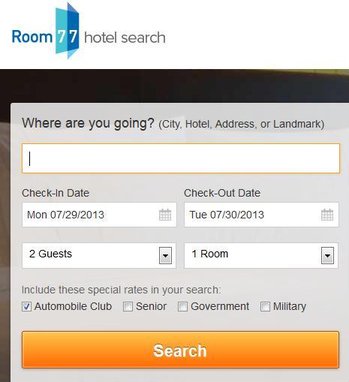Are hotel search engines set for a long stay in the booking process?
Kayak’s acquisition by Priceline, Expedia’s acquisition of Trivago and Expedia’s participation in Room 77’s last round of financing proves that travel meta-search is on fire right now. A lot is expected from vertical search in the hotel booking industry and there is still everything to play for.
The continuous improvement in search means travellers will be able to find precise room details, and make a much more informed decision on what is the best hotel for them. From a monetisation perspective too, players highlight that unlike OTAs that are tied to merchant commissions, hotel search sites can emulate traditional search engines and monetise in many ways, including distribution partnerships, commissions, and advertising.
Travellers are increasingly gravitating to hotel search sites like Room 77 or HotelTonight over booking with agencies. Although not everybody would agree, Drew Patterson, CEO of Room 77 says this is because hotel search sites provide more comprehensive results that save consumers money. And pure play hotel search sites are better equipped to focus exclusively on the hotel search problem.
Room 77 claims that it is the only hotel search engine to deliver many different rates types, such as AAA, senior and military or government rates, and those rates that are eligible for loyalty points and are fully cancellable. The site also make it easy to quickly filter by free amenities like free WiFi and free breakfast, so travellers can find the hotel that best meets their needs. At the same time, Patterson admits that it’s still too hard to find the right place to stay. “Hotels are such a subjective and personal decision…whether they are travelling for business, leisure, family or romantic getaway,” he says.

Here EyeforTravel’s Ritesh Gupta talks to Patterson about the efficacy of hotel search engines.
EFT: How mature is the hotel search category at this point?
DP: Hotel search is just starting to heat up, and we see tremendous opportunity with vertical search. There were than 12 billion hotel queries in 2012, however, fewer than 500 million of those queries derived from search engines. Given the nature of search and our ability to scour the web and pull in pricing from many different partners – OTAs, booking sites and hotels directly - we believe that we can better serve the needs of travellers looking for the best room at the best price. The migration to search engines will be further accelerated by the continued increase in mobile search and bookings.
EFT: What is the average time spent on a hotel meta-search site today and how visitors generally arrive at a decision?
DP: Our goal is to help people book the best room at the best price and to put all the information they need at their fingertips so they can do so quickly and easily. According to the Google’s Hotel Research Study, the average traveller visits 17.5 sites before booking a hotel, and 14 minutes on a hotel website vs. 11 minutes on a booking engine. This goes back to the fact that search engines like Room 77 help travellers find the best room and the best price, quickly.
EFT: Can you explain how Room 77’s search technology cuts down on the time that it is taken to make a decision? And how some of the features that your team has developed contribute to this?
DP: Our search technology was built by some of the brightest minds in search, including several ex-Google PhD engineers, and the algorithm they built enables us to scour the web and pull in more sources, from online travel agencies to hotels to booking engines, for more than 250,000 hotels across the globe. As a search engine, we are not limited to providing rate information on a limited supply of rooms at a given hotel, and travellers benefit by having all the rates available right in front of them, allowing them to make a more informed decision quickly and easily.
EFT: How do you think mobile sites and apps are lending a new dimension to hotel search? Is there anything about mobile as a device that complements search as an activity?
DP: Consumers are turning to mobile sites and apps in every part of their online experience. In travel, this trend makes search even more important. It’s much harder to compare prices on multiple sites on a phone; a hotel search engine like Room 77 does this on the traveller’s behalf. Mobile users also operate in real-time so we see a high percentage of same-day bookings coming through mobile for users who need a place on the go.
EFT: Can you explain how your search offering is specifically tailored for mobile and how it differs from desktop site?
DP: On the web, travellers are looking for more information, more details, to research and consider. On mobile, travellers want the most pertinent information – hotel, star rating, and the best rate – front and centre. Another key component of our mobile experience is our branded book tool, where we host the check out page so users always get a mobile-optimised experience. Many hotel websites aren’t designed for mobile, so this is a critical consumer feature.

